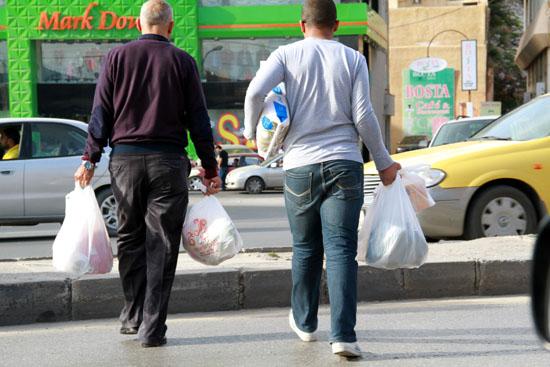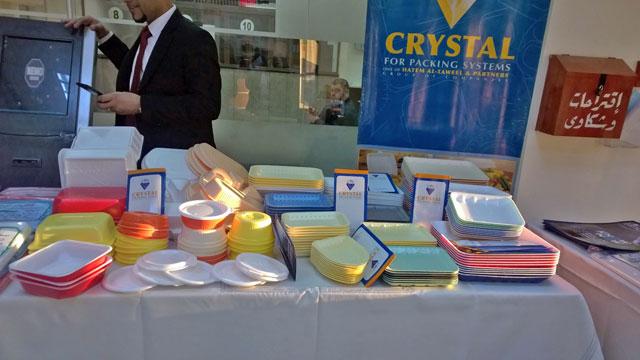You are here
Bakeries, factories commend ban on use of recycled plastic bags for fresh food
By Dana Al Emam - Mar 02,2015 - Last updated at Mar 02,2015

AMMAN — Representatives of the plastic bags industry and the bakeries sector on Monday commended the Jordan Food and Drug Administration’s (JFDA) recent decision to ban the use of recycled plastic bags in direct contact with food items.
The owner of a local plastic factory in east Amman, who preferred to remain unnamed, told The Jordan Times the new regulations require plants that manufacture plastic bags sold to bakeries and grocery stores to acquire certification from the JFDA specifying the bags as “food approved”.
He added that the dyes used in the industry cannot be imported without health certificates that ensure they match local standards, noting that the “majority of factories abided by these two standards even before the recent decision”.
He said the ban includes black plastic bags, as the colour might hide the presence of recycled ingredients, noting that the JFDA has given plastic factories a four-month grace period as they might have imported the raw materials to produce black bags.
Discussions with the JFDA and the Environment Ministry are still under way to shape the details of implementing the decision, the factory owner said.
“Jordanians’ health is more important than anything else,” he said.
Bakery Owners Association President Abul Illah Hamawi agreed.
The new regulations do not entail extra costs on bakeries, which have arranged that plastic factories provide them with bags that meet the new standards, Hamawi told The Jordan Times.
He added that stakeholders have not yet decided whether the JFDA-approved bags will feature the administration’s logo or it will issue certifications to committed bakeries that will be hung inside the premises.
“Over 90 per cent of bakeries deal with committed plastic factories,” Hamawi said, calling on authorities to come up with measures to supervise the use of disposable plastic cups and dishes, as they are widely used.
According to a statement carried by the Jordan News Agency, Petra, some 1,200 institutions work in the plastic and packaging field in Jordan, and employ over 20,000 workers.
In 2014, the value of Jordan’s plastic and rubber exports amounted to JD108 million, while those of the packaging industry stood JD353 million, compared to JD75 million and JD410 million respectively in 2013.
Major export markets of Jordanian plastic products include the US, Sweden, the UK, Canada, Ukraine, Iraq, Tunisia and Palestine.
Under the new standards, plastic factories will add a material that makes plastic bags dissolve within a period that does not exceed 24 months, sector representatives told Petra.
In a statement issued on Sunday, the Amman Chamber of Industry said local plastic products are “safe and meet international standards”.
In another statement on Sunday, the JFDA noted that the regulations do not ban the use of plastic bags altogether but stipulate the use of “virgin plastic bags” when in direct contact with food.
The administration has started an inspection campaign to ensure that recycled plastic bags are not used for bread, fruit and vegetables.
Related Articles
The Jordan Food and Drug Administration (JFDA) plans to ban the use of recycled plastic bags and containers used in direct contact with food items starting next year, an official said on Monday.
Health and environment experts on Monday urged producers of food packaging and containers to manufacture “food grade” products to safeguard public health and the environment.
The Jordan Food and Drug Administration (JFDA) will begin inspection campaigns on Sunday to ensure that new regulations banning the use of plastic bags for bread, fruit and vegetable purchases are being followed, JFDA Director Hayel Obeidat said Saturday.


















